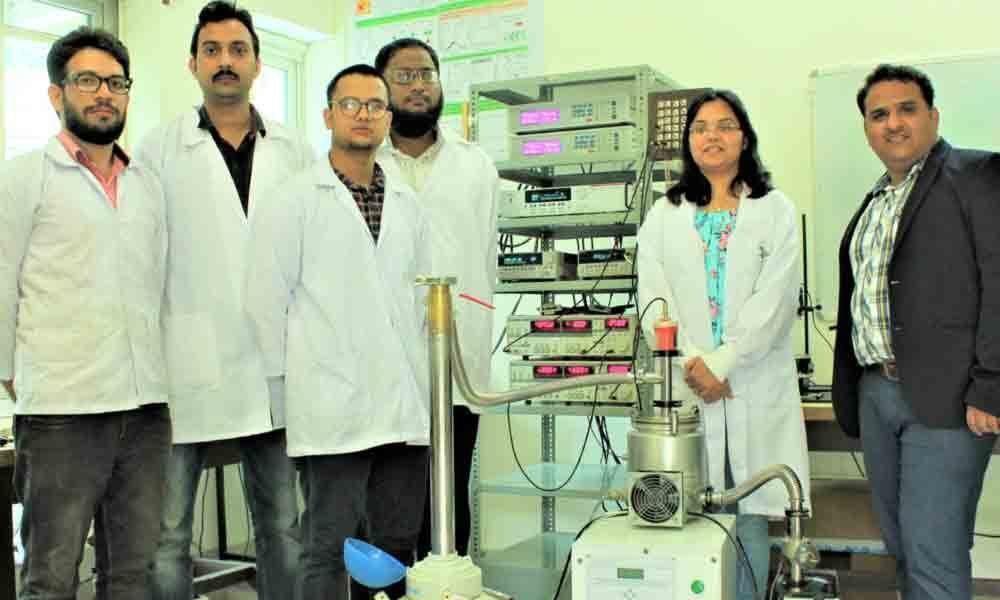Live
- CM for clear strategy to ensure Southern states get their due
- SCR cancels Sabarimala special trains citing low occupancy
- Vizianagaram: Youth fly drones to highlight bad road
- Vijayawada: Inter-district offender nabbed, Rs 26 lakh loot seized
- Congress cancels all programmes for 7 days in honour of Dr. Manmohan Singh
- Nara Lokesh Pays Tribute to Manmohan Singh, says he is a visionary leader
- 6th World Telugu Writers meet from Dec 28
- Sri City role in strengthening Atmanirbhar Bharat lauded
- PCC chief accuses PM of lying on Visakha steel
- Vaikunta Dwara Darshan: Only those with tokens, tickets to be allowed
Just In
IIT-Mandi to convert heat into electricity


Researchers at the Indian Institute of Technology (IIT) Mandi are developing novel thermoelectric materials that can efficiently convert heat into electricity.
Mandi: Researchers at the Indian Institute of Technology (IIT) Mandi are developing novel thermoelectric materials that can efficiently convert heat into electricity.
While solar power has received a lot of attention, other alternative sources are equally promising, even if less known, researchers said. Generating power from heat, for example, is attractive as there is a lot of heat that is created through human activities in industry, power plants, home appliances and automobiles where most of this heat is lost, they said. There has been considerable interest in recent years in the development of technologies that can dynamically harvest energy from the environment and convert it to electricity. Such futuristic technologies consider Sun, heat and mechanical energy as sustainable sources of energy.
"Thermoelectric materials work on the principle of Seebeck effect, in which electricity is generated due to temperature differences across the junction of two materials," said Ajay Soni, Associate Professor at IIT Mandi in Himachal Pradesh. "A typical thermoelectric material must have the trifecta properties of high thermoelectric power and electrical conductivity, low thermal conductivity with a capability of maintaining a temperature gradient," Soni said in a statement.
"This combination of properties is hard to come by and a few semiconducting materials must be tweaked further for a good thermoelectric efficiency," he said. Soni noted that in the Western world, many automobile companies, including Volkswagen, VOLVO, Ford and BMW are developing thermoelectric waste heat recovery systems that promise 3-5 per cent improvements in fuel economy. Other potential applications for thermoelectric energy harvesting includes powering consumer devices and electronics, aviation and even space applications, he said.
Soni studies semiconductors such as bismuth telluride, tin telluride and silver containing crystalline superionic argyrodites and spikes them with various elements in tiny quantities to improve the 'thermoelectric figure-of-merit,' a metric that indicates the thermoelectric efficiency of the materials system. Ideally, a figure-of-merit value of 3-4 can convert more than 40 per cent of waste heat to useful electrical energy, but in reality, it has hovered around 1, insufficient for practical application, Soni said.
His research group has observed novel soft phonon modes which are demonstrating better thermoelectric performances with a high figure of merit in the range of 1-1.6 for various materials. The outcome gives scope for further explorations and improvements, researchers said. About 70 per cent of energy in the world is wasted as heat and this heat is released into the environment, becoming one of the key players of global warming, they said. The trapping and conversion of waste heat into electricity can serve the dual purpose of energy-self-sufficiency and environmental preservation.

© 2024 Hyderabad Media House Limited/The Hans India. All rights reserved. Powered by hocalwire.com






